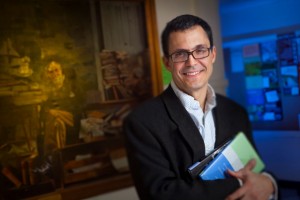
Paul Cefalu
Obsessed. Hoarding: Buried Alive. Animal Hoarders. A&E, TLC, Animal Planet, and other channels are finding an audience for latest reality TV about obsessive-compulsive disorder (OCD), and Paul Cefalu wants to know what is behind the interest in watching people who suffer from mental illness.
Cefalu, associate professor of English, is exploring this topic in his work-in-progress: Wringing Our Hands: Obsessive-Compulsive Disorder and the Morality of Will, essays on the history of representing mental illness, especially obsessive-compulsive disorder and compulsive hoarding. The book is under contract with The University of Michigan Press.
The essays for the book will address questions such as: Why do the mainstream media nearly always represent OCD as humorous? Is there something particular about the contemporary culture of irony that shapes recent pop cultural depictions of the disorder? Why has there been a proliferation of interest in compulsive hoarding, a common subtype of OCD? How should compulsive hoarding be distinguished from avid collecting? Why has much of the recent self-help work on OCD focused on scrupulosity (pathological guilt about moral or religious issues)?
Cefalu is also working on a book about representations of disability in the Bible and early modern literature, exploring issues such as what the Bible and 17th-century literary texts suggest about the lame, deaf, and blind and how these disabilities are related to sin in those works.
“This work, along with the work on representations of OCD, marks my engagement with the burgeoning fields of disability studies and the medical humanities,” Cefalu says.
He also has a book coming out in March from Palgrave Macmillan Press. Along with Bryan Reynolds of the University of California, Irvine, Cefalu recently edited a collection of original essays, The Return of Theory in Early Modern English Culture.
“This volume aims to be the first collection of multidisciplinary essays that looks at the growing rapprochement between contemporary theory and early modern English literature and culture,” Cefalu says.
The book covers cognitive theories of metaphor in literature, consciousness studies, materialism, and the religious turn in early modern cultural studies. One goal of the collection is to theorize a convergence or overlap between the seemingly disparate disciplines of science and the humanities—for example, exploring the use that literary critics and cultural historians can make of recent findings in neuroscience, evolutionary psychology, and cognitive theory.
Cefalu, who joined the Lafayette faculty in 1999, is also the author of English Renaissance Literature and Contemporary Theory: Sublime Objects of Theology (2007), Moral Identity in Early Modern English Literature (2005), and Revisionist Shakespeare: Transitional Ideologies in Texts and Contexts (2004).
